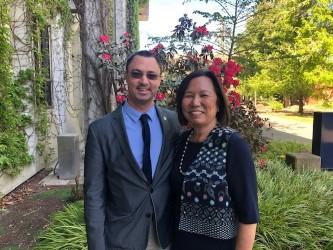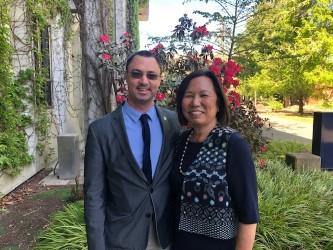Editor: The following opinion piece is based upon a personal story that I wish to offer for publication as I am soon to be an alumnus of Sonoma State University (SSU).
Hello Class of 2019 readers! Have any of you ever felt ready for a change, but you did not know what that looked like? So have I. Before transferring to SSU in Fall of 2017, I was unsure about my purpose in life. I had completed ten years of study at Santa Barbara City College. Yet, something still was missing. It was a one unit Women’s Gender Studies lecture series course here at SSU that shifted my sense of purpose.
As graduates, we have survived many semesters at SSU. And by survived I mean, it was not easy to get here today. And yet, here we are. Regardless of whether you came here as a transfer student, like myself, or entered as a freshman, we can all agree we are not the same people we were when we started our journey at SSU. Today, I choose to share my story of a shift of being that I experienced as a result of accepting a challenge. This required me to become vulnerable in unfamiliar territory.
Spring 2019 semester I was excited to be enrolled in Dr. McQuade’s Foundation of Feminist Thought, because I knew that this course was where all of my previous course work would come to fruition. I shared this excitement with my professor and unofficial academic advisor, Suzel Bozada-Deas, that Iwas the only white heterosexual male enrolled in this class. Suzel acknowledged my excitement and issued a challenge. She said: “You are not allowed to speak in class unless specifically invited to by classmates or Dr. McQuade.” Wow, how am I supposed to participate in class, I thought.
My trust for Suzel’s command stemmed from past experiences where I had allowed myself to become vulnerable by playing two different female characters, two consecutive times, first as the student, and second as the teacher assistant during her Gender, Race, and Class course, where she employs a roll playing simulation game circa 1913 Greenwich Village.
So, I accepted Suzel’s challenge thinking to myself, “Whatever you say goes Suzel.” I expressed to her how deeply I wished to understand the oppressive gender-isms that are the result of a patriarchal society, which for many societal members consist of a day to day survival routine, as opposed to my alike members, white heterosexual males, who employ their privileges without a second thought.
Then, Suzel hit me with: “Matthew, you will never fully understand what it feels like to be oppressed within a gender-ism. And if you say you do, I won’t believe you.” Suzel’s communication was simple: As long as I was living an advantaged life of a heteronormative way of being, that is employing my privileges that are most often than not, taken for granted, I am like an alcoholic––always in recovery.
My way of thinking began to transform. This process hurts. Then to be told by Suzel that for reasons beyond my control, that is living within a patriarchal society, my way of being will never fully transform. That hurt even more.
And so, with high stakes, I sat through 14 weeks of engaging in a new way of being. I surrendered my voice, and silently listened until invited to speak. Prior to this challenge, I meant well and had constructive thoughts to contribute in discussion; however, I tended to dominate conversations. I was unaware of the physical space that I occupied with my stuff like my hiking backpack, all of my books, and my oversized binder. Most importantly though, during the conversations where I remained silent, I was uncomfortable and saddened to hear students’ personal stories who’ve experienced some form of ism and oppression. I so very much wanted to verbalize my thoughts or use touch in one’s personal space to offer support and empathize. Yet, I could not obtain affirmative consent for physical touch as it requires verbal communication. So, I was left sitting silent with moments of sadness and flowing tears. This enrolling challenge had me in communication with myself. Me, myself, and I were all we had. And bonding us together was my femininitythat I cherish to this day.
At the story’s end, Suzel’s challenge and the Foundation of Feminist thought course, were the catalysts for my transformation. I found my life’s sense of purpose! And, that’s what is in it for you males out there who have not accepted such a challenge and are open to one if the moment strikes. It is the most rewarding thing one can ask for. Now, having undergone a new way of being, when I am invited to speak in class or on my own outside of higher education, my tone of voice, inflection, and overall proximity is consciously present during conversations.
I invite white heterosexual men to consider why, and how we can transform patriarchy to an ideal construct where all human beings have a shared inalienable right—to be boundless by race, class, and/or gender. This process to get there is transformation. And, my continual contribution, all started by accepting an invitation to a challenge, which tested my ability to be vulnerable, and go against any societal construction where men and masculinity had indoctrinated me to think my femininity is of little or of no use in society.
With that said, a sincere congratulations to Class of 2019, and I wish you all to find your story, and see that transformation of your inner-being in the future.
And to the white heterosexual male faculty and staff, families and friends and most importantly Class of 2019, I invite you to radically:
Enroll yourself within a challenge,
Communicate with yourself and others,
And Transform Yourself,
So we may all work toward a humanitarian vision where:
Race, Class, and Gender know NO boundaries!
Thank you all.
Respectfully,
Matthew Phelps Poulin
Matthew Phelps Poulin graduates with a BA in Communication and Media Studies, and a minor in Women’s Gender Studies. He has dedicated three semesters of enrollment within KSUN Radio, and served his senior year as sonomastateradio.com’s Production Director. Poulin graduates with department distinction. He uses FeministIntersectionalityas a lens to transform solutions in team environments increasing productivity among community members.




































